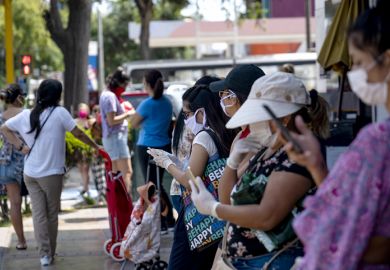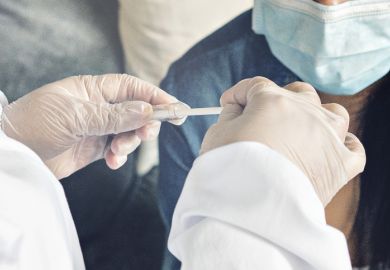Almost a fifth of students who tested positive for Covid-19 at one UK university did not report having any of the main symptoms, according to preliminary findings of a study that says data from pre-Christmas mass testing will be crucial to understanding more about the spread of the virus among students.
The research, which was led by academics at the University of Bristol’s Covid-19 Emergency Research Group (known as Uncover) and published on the pre-print server medRxiv, was based on responses from 740 students to an anonymous online questionnaire conducted between 14 September and 1 November, before the second national lockdown.
It found that 19 per cent of students at the institution who had tested positive in the prior fortnight did not report having a fever, cough or loss of taste or smell, while 43 per cent did not report a cough or a fever. Individuals must have one of those main symptoms to be eligible for a free NHS Covid-19 test.
However, testing asymptomatic students has recently been initiated as part of the voluntary mass testing of all students in the run up to the winter break and the paper says the data from this initiative will be valuable in establishing the prevalence of Covid-19 in the student population. Some universities have also been testing asymptomatic students and staff since the beginning of term using their own testing regimes.
The paper adds that first-year undergraduates were more likely to be isolating within the prior seven days than other year groups, especially those that live in halls of residence, confirming that Covid cases have been concentrated among students living in large, shared living accommodation.
The authors said that the results were “likely generalisable to other UK city-based universities, as well as to some city-based universities in other countries which are similar in structure and Covid-19 status” to the University of Bristol.
The study, also found that the majority of students were complying with government Covid-19 guidelines and self-isolating when receiving a positive test.
Of the 42 students who tested positive in the fortnight prior to filling in the survey, 99 per cent said they had been self-isolating.
Meanwhile, students reported an average of six daily contacts, which is significantly lower than in previous student questionnaires conducted before the pandemic, suggesting that they have changed their behaviour in response to government guidance. However, some students, particularly those in halls of residence, had large numbers of daily contacts, mainly dictated by their large household sizes.
Around 40 per cent of student contacts were with individuals not affiliated with the university, indicating the potential for transmission outside of the institution.
The authors recommended that students are encouraged to limit their contacts with those outside of the university and to adhere to physical distancing, hand washing and mask-wearing measures.
Register to continue
Why register?
- Registration is free and only takes a moment
- Once registered, you can read 3 articles a month
- Sign up for our newsletter
Subscribe
Or subscribe for unlimited access to:
- Unlimited access to news, views, insights & reviews
- Digital editions
- Digital access to THE’s university and college rankings analysis
Already registered or a current subscriber?









